Sustainability Bootcamps for signmakers
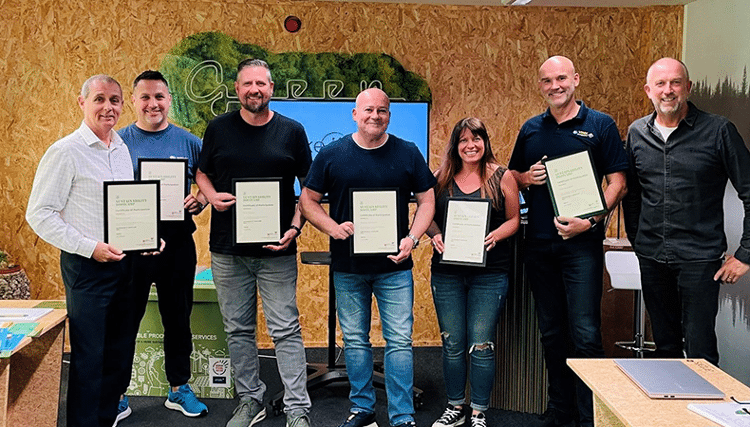
We spoke to Steve Lister about how members of the print and signage industries are learning to embrace sustainability on Make it Happen’s Sustainability Bootcamps.
“Print companies are facing a lot of pressures from customers right now because customers themselves are under a lot of pressure to deliver sustainability. If you have a national contract or contracts, you are going to have to look at sustainability in more detail than you have ever done before,” Steve Lister explains.
In many senses, then, sustainability is an evolving landscape. However, the fundamental qualities of good print and signage actually sit very comfortably within the demands of modern sustainability.
“Signage companies have been building durable, updatable, serviceable products for years. If you put a sustainability lens on those elements, it is actually very positive. Longevity of life, that’s sustainable. If you use LED lights, that’s sustainable. If you’re using some form of aluminium or steel in your signage, those are two of the most recyclable materials in the world. Even if you’re using some plastics, those can be recycled at the end of their life.
“So the industry isn’t in the single-use plastic, print-make-throwaway environment; we make durable signs that last for years. That is a very sustainable way to run an industry, but I don’t think the sign industry appreciates just how sustainable it actually is.”
Making sustainability simple
To help foster an appreciation and provide members of the industry with a firmer grasp on the issues involved in sustainability, signage consulting and workshop provider Make it Happen (makeih.com) has devised a Sustainability Bootcamp, hosted by Steve, who himself has a distinguished history as a consultant on sustainability for global brands and retailers.
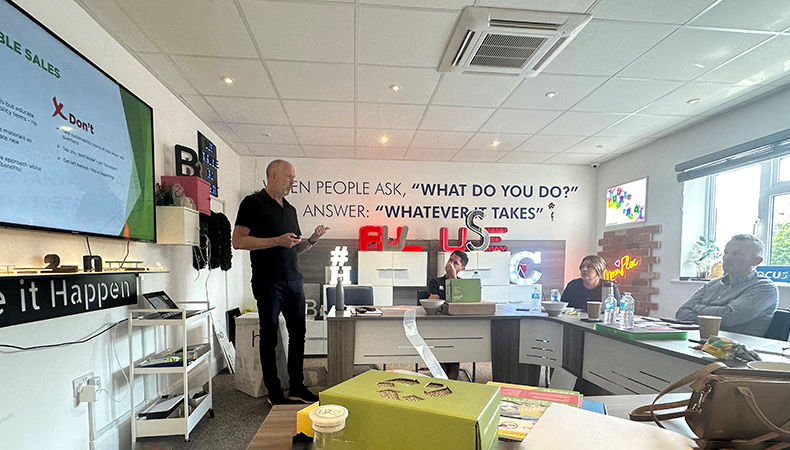 Steve Lister, addressing a Bootcamp, intends to create an informal environment that simplifies sustainable practices. © Make It Happen
Steve Lister, addressing a Bootcamp, intends to create an informal environment that simplifies sustainable practices. © Make It Happen
“People think sustainability is complicated and complex, so they have tended to shy away from dealing with it. We often hear people express they have been asked to include sustainability data in tenders but they don’t really know what they are doing,” Steve says.
“The reason for the Sustainability Bootcamps is to make sustainability simple, specifically for the sign and display sector. Over the course of a day, people can enter a more relaxed atmosphere and feel comfortable with what we are all doing.
“We start by looking at factors like sustainable perceptions and we have a discussion around what is more sustainable – for example, is a digital screen more sustainable than if you make something physical? That sets a nice ground level from which we can start looking at things like the global impacts that effect people making signage or people involved in corporate marketing. We discuss why sustainability matters and the key challenges, but all at a level where delegates feel comfortable.”
Doing your homework
One of the most important aspects of the Sustainability Bootcamp is to inspire attendees to reassess their existing notions of sustainability, and that actually starts wih conducting research before the workshop even begins.
“We ask all attendees, before they come on the course, to send us their preconceived ideas of what’s a good sign or print and what’s a bad sign or print. Then – during the morning – we review their research and it’s really interesting that so many of them will say they have changed their mind about what they originally thought,” Steve says.
“That creates a really good collaborative discussion. At that point, we break down the myths and say certain materials are better than people might think. For example, they might have thought negatively about mild steel because it is a metal, but mild steel is the most used material in the world for signage and it’s also the most recycled material in the world. In fact, 98% of all the mild steel ever made is still in circulation because it has been recycled so successfully.
“So, when you give people those kinds of facts and figures, it makes them realise that they are in an industry that is inherently sustainable. By the end of the morning session, attendees begin to realise how straightforward sustainability can be.”
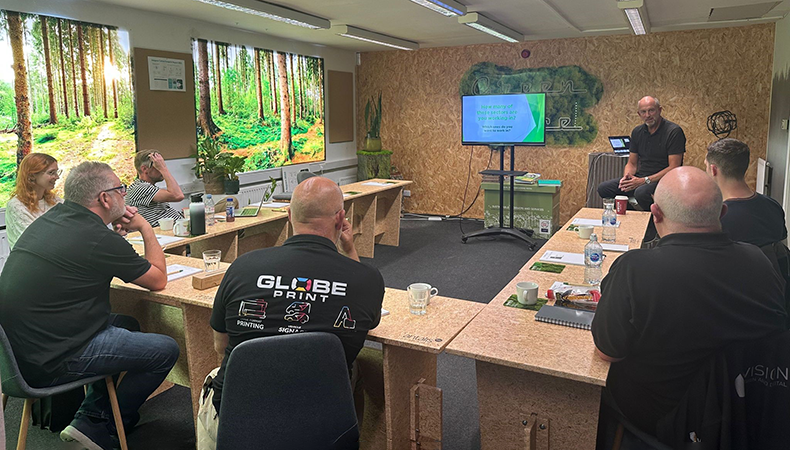 Steve has built relationships and shared knowledge with more than 120 people so far. © Make It Happen
Steve has built relationships and shared knowledge with more than 120 people so far. © Make It Happen
In the afternoon, the Bootcamp looks at design and material trends and provides hands-on experience examining materials such as plastics, wood, glass, metal, fibre-based materials, digital materials, inks and LEDs. Attendees see in detail how these resources are made, what their sustainability credentials are, and how they can be recycled.
“We conclude the day by discussing how attendees can use all of their knowledge and market sustainability successfully for their business,” Steve says. “The delegates joining the course are experienced in their field; however, they are eager to learn more about sustainability.”
People power
Crucially, as well as physical materials, there are other elements of sustainability that are scrutinised, not least the new stakeholders that people in the industry may come into contact with.
“In the past, a sign and display company might have been asked to move away from PVC, and that request might have come from just one person from one customer. What we are finding now is that if you need to deliver sustainability within sign and display, you might get asked questions by company CEOs, or sales and marketing, or operations, or end of life. Therefore, we explain that they will probably be asked questions by people they have never dealt with before.”
This broader range of interested parties has been witnessed directly by Steve and the MiH Sustainability Bootcamp team as well.
“We have delivered the Bootcamp course to more than 120 people so far. We’ve had managing directors and business owners, operation directors, designers and new starters. This demonstrates people are seeing the requirement, but that it is needed across all levels of businesses,” Steve says.
“Some companies have embedded the Sustainability Bootcamps into their whole way of working. They can then flow that through to the work that they are doing with their customers.
“I can’t provide names, but I can tell you that some of the biggest sign-making companies are now started to send their customers – huge national businesses outside of the industry – on these Bootcamps. This emphasizes the importance of these bootcamps. You can build relationships, share knowledge and become closer you’re your customers because you are involving them in the same sustainability journey.”
To find out more about Make it Happen’s Sustainability Bootcamps – with discounted rates for FESPA members – visit: makeih.com/sustainability-bootcamp-book-your-place
Become a FESPA member to continue reading
To read more and access exclusive content on the Club FESPA portal, please contact your Local Association. If you are not a current member, please enquire here. If there is no FESPA Association in your country, you can join FESPA Direct. Once you become a FESPA member, you can gain access to the Club FESPA Portal.
Recent news

Regulation guidance: Corporate Sustainability Reporting Directive
The Corporate Sustainability Reporting Directive (CSRD) is now in effect, but with further changes on the horizon, what does it mean for printers? Sustainability consultant Rachel England outlines everything you need to know and talks to Apigraf about how your business may be affected.

Web-to-print design: Canva versus Kittl
We look at popular design packages Canva and Kittl to determine how they compare regarding graphic design and print on demand.
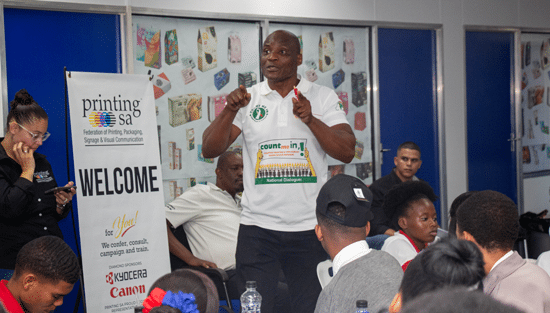
FESPA in South Africa: the print skills to thrive
Printing SA’s Career Day inspired young Cape Town learners to explore printing and packaging careers.
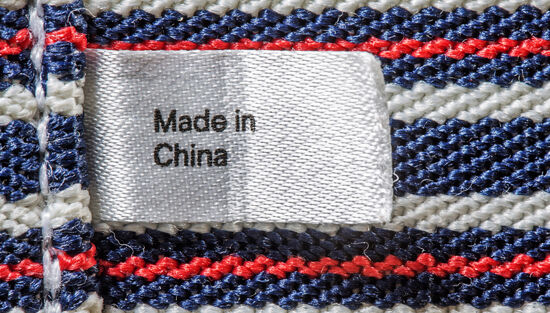
The rise of Chinese printers
Chinese printing companies are on the rise, and have their eyes set on the UK and EU marketplace. Some have made an instant impact; others are running into issues with maintenance and language barriers. What does the future hold for Chinese printing firms, and how can you navigate working with them?